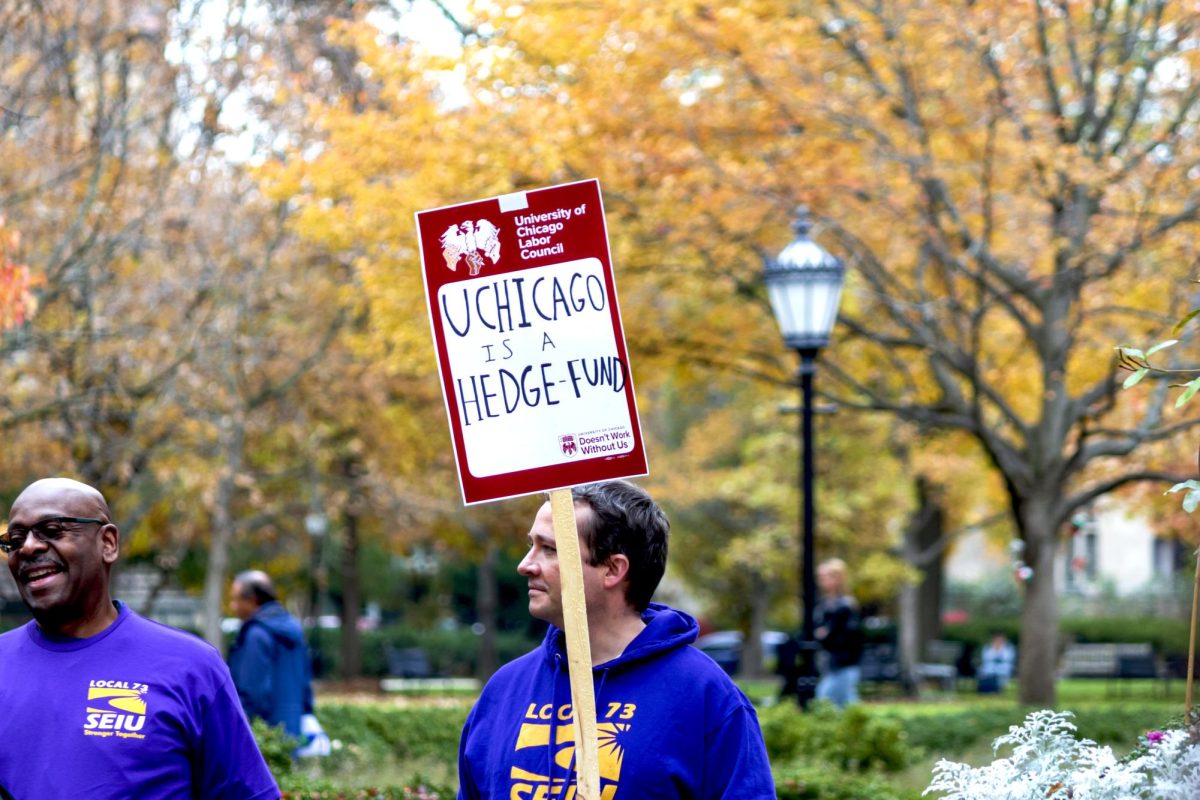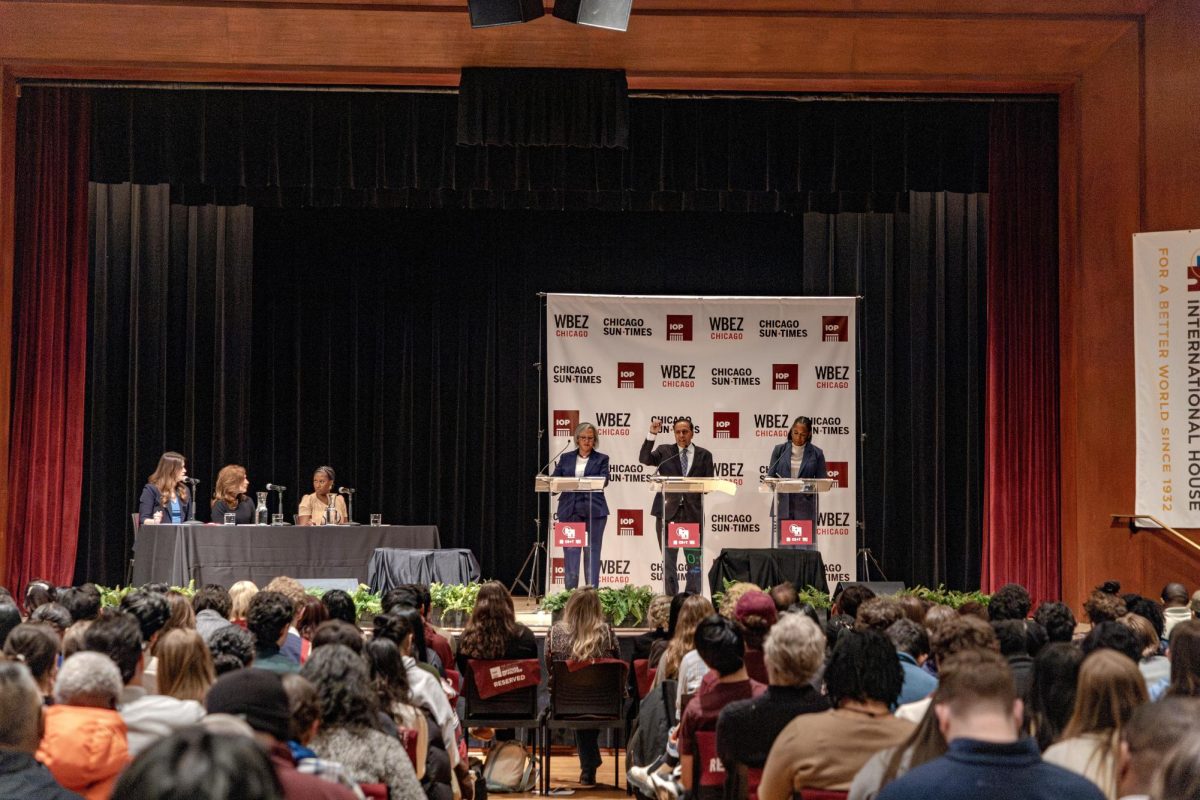Faculty Forward (FF), the union representing non-tenure-track faculty at the University of Chicago, commenced its third round of contract negotiations with the University in early March. Since unionizing nine years ago, FF brokered two collective bargaining agreements in 2018 and 2021, establishing better wages and clearer promotion policies for non-tenure-track faculty.
While fluctuating each quarter, FF represents about 450 part- and full-time instructional professors. Last October, Writing Faculty United, the union of Writing Specialists at the University, were granted the right to join FF. The addition of writing instructors and specialists expanded FF’s membership by 10 percent, pushing membership to more than 500 people.
According to FF data, members contribute significantly to undergraduate education at the University, teaching more than half of all college courses. Within some divisions, such as the Humanities Collegiate Division, that figure is as high as 75 percent.
“We are sort of the workhorses of the classroom,” FF Secretary Tristan Schweiger said.
For this new round of contract negotiations, FF identified increased compensation for non-tenured faculty as their foremost priority. In the past decade, a 41 percent increase in undergraduate tuition and a 32 percent increase in undergraduate enrollment has led to a substantial rise in the University’s revenue; despite this growth, salary for non-tenure-track faculty has lagged. According to data provided by FF, the gross increase in tuition revenue has outpaced the rise in aggregate academic salaries by 30 percent. Erica Warren, a member of FF’s Bargaining Committee, explained how this stagnation requires non-tenure-track faculty to “do more with less.”
Such stagnations in faculty compensation occur simultaneously with notable allocations to University executives. “In 2021, the University reported the salaries for the top 25 executives as totaling more than $32.5 million. In comparison, approximately 450 faculty members of FF, excluding writing instructors, made about $21 million in salary,” Warren said.
According to FF, this disparity in wages has adversely impacted the livelihoods of non-tenure-track faculty. Although prices for consumer goods have risen 18 percent since January 2021, FF has received wage increases amounting to less than half of that.
FF Executive Committee member Jason Grunebaum said that the University’s reluctance to provide fair wages to non-tenure-track faculty conflicts with the significant impact that they have on the education of undergraduate students.
“We would like to help nudge the University to get back to recognizing that its core mission is teaching and research and compensating those who are in the classroom with the students every day appropriately,” Grunebaum said.
In light of the University’s current budgetary constraints, staff hiring freezes, the closing of research institutes, and other cost-cutting measures have all been implemented. Yet, Schweiger refutes using the University’s financial uncertainty as a pretext for reducing faculty compensation.
“We absolutely reject efforts to make up [the budget deficit] by taking money from the people who do the work of teaching at this university,” Schweiger said. “We need to actually make a living wage.”
In a statement to the Maroon, the University said that the 2021 collective bargaining agreement included a 7.5 percent wage increase over three years for instructional professors and a 35 percent wage increase for part-time instructors at the Crown School.
The negotiations also focus on improving visa arrangements for the union’s 88 foreign faculty members. Tenure-track faculty usually receive a H-1B visa, which imposes the fewest number of restrictions and offers a path to green card sponsorship. According to Schweiger, the high cost of H-1B sponsorship means foreign non-tenure-track faculty are often given temporary visitor visas (J-1 visa) instead. These visas leave faculty members more “vulnerable” and often require the visa holder to return to their home country after a certain number of years. In some instances, non-tenure-track faculty have been asked to leave the country on a 24 hour notice, according to Schweiger.
Moreover, following the merging with Writing Faculty United, FF is demanding appropriate compensation for the University’s Writing Specialists. Schweiger said many writing instructors are working full- or close to full-time but are not eligible for any benefits.
Through their negotiations, FF seeks to redefine the University’s perception of non-tenure-track faculty.
“Management has always been very insistent that there is a hard line between teaching faculty/non-tenure-track faculty and research faculty, and we have always fundamentally rejected that,” Schweiger said. “For one thing it undermines solidarity among workers, but also we feel that we are entitled to participate in the conversations among faculty and the benefits granted to faculty.”
Grunebaum said FF’s efforts in previous negotiations have contributed positively to the lives of faculty.
“I’ve really had the pleasure of seeing, over the years, just what a huge difference it’s made to the lives of my colleagues,” Grunebaum said. “There’s less and less part-time faculty having to run around to five different campuses in the Chicago area just to make ends meet. I’m not saying that doesn’t still happen, because it does. But there’s less of that.”
Moreover, FF believes that the benefits of increasing faculty compensation trickle down to students’ educational experience.
“I think it all ultimately means better conditions for students. You want a professor who is engaged, supportive, and responsive to your questions and needs, and the worker who is doing that needs to be making a living wage and needs to not be worried about how they’re going to make ends meet so that they can devote that to the classroom… It’s really an investment in the future,” Schweiger said.
The timeline for negotiations depends on progress made during each meeting. Members of Faculty Forward expressed optimism for a productive dialogue.
“We hope that the University will be open and receptive to a conversation with us,” Grunebaum said. “We are 100 percent committed to these proposals, we’ve got a really fired up bargaining unit, and we expect a lot of participation.”
In its statement, the University said it was looking forward to continuing negotiations.
“The University is negotiating in good faith with Faculty Forward,” the statement said. “We are grateful for the contributions of the approximately 450 instructional professors represented by the union and look forward to working constructively on a contract renewal that will benefit employees and serve students. We are hopeful for a timely resolution to the negotiations.”
Editor’s note, March 29, 2024, 5:48 p.m.: This article has been updated to include a statement and additional context from the University.















